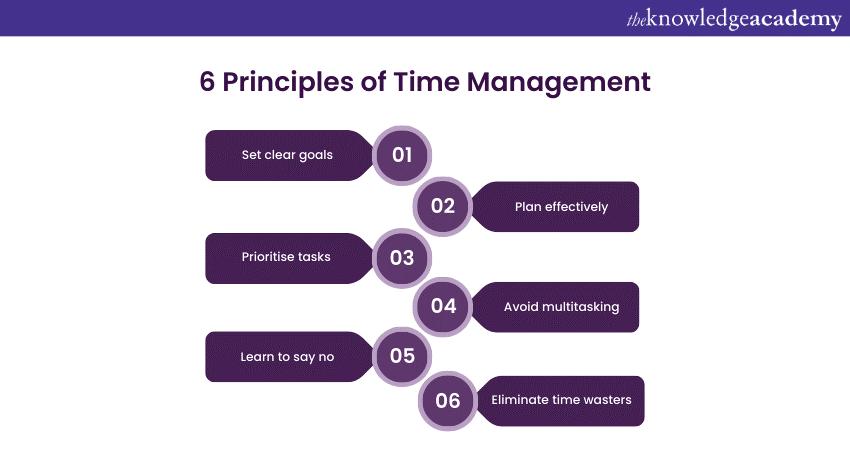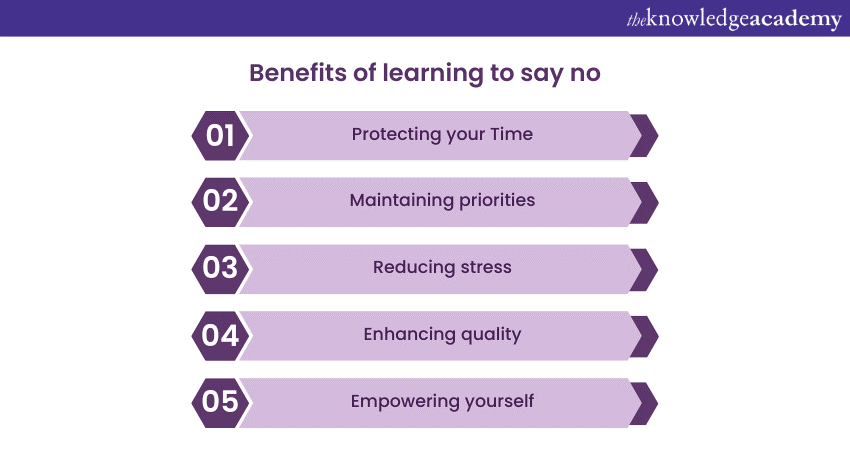We may not have the course you’re looking for. If you enquire or give us a call on +45 89870423 and speak to our training experts, we may still be able to help with your training requirements.
Training Outcomes Within Your Budget!
We ensure quality, budget-alignment, and timely delivery by our expert instructors.

In today's fast-paced world, mastering Time Management is essential to achieving your goals, reducing stress, and finding work-life balance. From setting clear goals to eliminating time wasters, each principle is a valuable tool in your quest for efficient and effective Time Management.
Read this article to gain insight into 6 key Time Management principles that can assist you in effectively organising and scheduling your tasks efficiently.
Table of Contents
1) Understanding the importance of Time Management
2) 6 Principles of Time Management
a) Set clear goals
b) Plan effectively
c) Prioritise tasks
d) Avoid multitasking
e) Learn to say no
f) Eliminate time wasters
3) Conclusion
Understanding the importance of Time Management
Understanding the importance of Time Management is the foundational step towards achieving greater productivity, reduced stress, and a more balanced and fulfilling life. Time, unlike many other resources, is finite and irreplaceable; you can never get it back once it is gone. Therefore, learning to manage it effectively is paramount.
Being efficient in managing time helps individuals maximise their productivity every moment. By setting clear goals and prioritising tasks, you can channel your efforts towards what truly matters, ensuring you accomplish your objectives efficiently. It allows you to maintain focus, avoiding the chaos of rushing from one task to another or succumbing to distractions.
Proper Time Management aids in stress reduction. When you have a well-structured plan and allocate time for different responsibilities, you minimise the last-minute rush and frantic scramble to meet deadlines. In turn, it leads to better decision-making and higher-quality work.
Time Management is instrumental in achieving a work-life balance. By optimising your work hours, you can create more time for personal pursuits, hobbies, and spending quality moments with loved ones.
Ready to take your Time Management skills to the next level? Explore our comprehensive Time Management Training today
6 Principles of Time Management
Time Management is the art of maximising your time to achieve your goals and tasks efficiently. The following are the basic Principles of Time Management:

1) Set clear goals
Setting clear goals is fundamental to effective Time Management and personal productivity. It involves defining specific, achievable objectives that guide your actions and help you focus on what truly matters. Here is an in-depth look at the importance and benefits of setting clear goals:
a) Direction and purpose: Clear goals provide advice and sense in your personal and professional life. They serve as a roadmap, helping you understand where you are headed and why. Without clear goals, you might feel aimless and lack motivation.
b) Motivation and focus: Goals give you a reason to work diligently. You are more motivated to act when you set clear, meaningful objectives. These goals constantly remind you what you are working towards, helping you stay focused on your priorities.
c) Measurability: Well-defined goals are measurable. They allow you to track your progress and evaluate your performance. This measurement helps you understand whether you are on the right track or need adjustments.
d) Practical planning: Once you have clear goals, you can plan your tasks and activities more effectively. You can break down your goals into smaller, actionable steps, making managing your time and resources easier.
e) Priority setting: Clear goals help you prioritise your tasks and responsibilities. When you know what's most important, you can allocate your time and energy accordingly. This prevents you from getting caught up in less critical tasks and lets you focus on what matters most.
2) Plan effectively
Planning effectively is a crucial Time Management principle involving organising your tasks and activities to maximise productivity and efficiency. It is the bridge that connects your goals to actionable steps. Here is a comprehensive exploration of why planning effectively is so crucial:
a) Clarity and focus: Effective planning brings clarity to your day. It helps you identify your most important tasks and goals, allowing you to concentrate your efforts on what truly matters. This focus minimises distractions and ensures that your time is well-spent.
b) Productivity enhancement: With a well-thought-out plan, you can manage your time efficiently. You can allocate specific time blocks to different tasks, making it easier to tackle them without feeling overwhelmed. This enhances your overall productivity.
c) Task prioritisation: Planning involves ranking tasks based on their importance and urgency. You can employ techniques like the Eisenhower Matrix or the ABCD method to determine which tasks need immediate attention and which can wait. This prioritisation allows you to save time on less critical activities.
d) Time allocation: Effective planning involves allocating time to specific tasks or projects. This allows you to estimate how long each task will take and prevents overcommitting. You will have a realistic schedule that helps you manage your time more effectively.
e) Reduced stress: Knowing what you need to do and when to do it reduces the stress and anxiety associated with uncertainty. A well-structured plan provides control over your day, reducing the likelihood of feeling overwhelmed.
Unlock your potential and invest in your personal development today! Explore a wide range of Personal Development Training Courses and take the next step in your personal growth journey now!
3) Prioritise tasks
Prioritising tasks is a critical component of effective Time Management. It involves determining the order in which you should tackle your responsibilities based on their importance and urgency. This principle is vital because it ensures you direct your time, energy, and focus toward tasks with the most significant impact. Here is a comprehensive exploration of the significance of prioritising tasks:
a) Efficient resource allocation: Prioritisation helps you allocate your limited resources—time, energy, and attention. By identifying high-priority tasks, you ensure that your most valuable resources are invested where they will yield the most significant returns.
b) Focus on key objectives: When prioritising tasks, you focus on your primary goals. This prevents you from getting sidetracked by less important activities that can drain your productivity.
c) Stress reduction: Prioritisation reduces stress by clarifying what needs to be done first. You are less likely to feel overwhelmed when you have a clear order of tasks. Addressing high-priority items promptly also minimises the pressure of looming deadlines.
d) Improved decision-making: Prioritisation requires you to decide which tasks are most important. This decision-making process enhances your critical thinking skills and helps you become a more effective problem solver.
e) Prioritisation: When you prioritise effectively, you create a roadmap for managing your time. You can allocate specific time slots to high-priority tasks and reduce the risk of procrastination or time wasted on low-value activities.
f) Goal achievement: Prioritising tasks aligns your actions with your goals. It ensures that you make consistent progress toward your long-term objectives. Over time, this approach has led to significant accomplishments.
4) Avoid multitasking
Avoiding multitasking is a fundamental principle of effective Time Management and productivity. It entails focusing on one task at a time rather than attempting to juggle multiple tasks simultaneously.
While multitasking may seem like a way to get more done, it often leads to decreased efficiency and lower-quality work. Following are the significance of avoiding multitasking:
a) Enhanced concentration: When you concentrate on a single task, you can dedicate your full attention and mental resources. This heightened focus allows you to understand the task deeply, make fewer mistakes and produce higher-quality results.
b) Reduced mental fatigue: Constantly switching between tasks can be mentally exhausting. Avoiding multitasking helps preserve your mental energy, preventing burnout and improving your overall well-being.
c) Improved efficiency: Focusing on one task at a time often results in faster completion. This is because you are not wasting time and cognitive resources on the mental gymnastics required to switch between tasks.
d) Better Time Management: Multitasking can create the illusion of productivity but often leads to unfinished or poorly executed tasks. By avoiding multitasking, you can better manage your time and ensure that tasks are completed promptly.
e) Enhanced problem-solving: Many tasks require problem-solving and critical thinking. Concentrating on one charge enables you to approach problems more effectively and develop innovative solutions.
5) Learn to say no
"Learn to say no" is a crucial principle of Time Management and personal effectiveness. It involves setting boundaries and assertively declining requests, tasks, or commitments when they do not align with your priorities or capacity. Following is an exploration of the significance and benefits of learning to say no:

a) Protecting your Time: Your time is a finite and valuable resource. Learning to say no helps you protect your time and prevent overcommitment. By declining tasks or activities that are not in line with your goals, your free up time for what truly matters.
b) Maintaining priorities: Saying no allows you to maintain focus on your most important tasks and objectives. It ensures that you allocate your time and energy to activities that align with your values and goals.
c) Reducing stress: Overcommitting can lead to stress and burnout. By saying no when necessary, you reduce the pressure of excessive responsibilities and create a more manageable workload.
d) Enhancing quality: When you say no to additional tasks or commitments, you can allocate more time and attention to your existing responsibilities. This often results in higher-quality work and better outcomes.
e) Empowering yourself: Learning to say no is empowering. It reinforces your ability to make intentional choices about how you spend your time and resources, rather than being driven by external demands.
Ready to ignite your motivation and set meaningful goals? Dive into our Motivation and Goal Setting Training and take the first step towards a more motivated and goal-oriented you!
6) Eliminate time wasters
Eliminating time wasters is a crucial Time Management principle that involves identifying and minimising activities, habits, or distractions that consume your valuable time without contributing to your goals or well-being. Effectively managing your time depends on your ability to recognise and eliminate these productivity-draining elements. Following is a comprehensive exploration of the significance and benefits of eliminating time wasters:
a) Increased productivity: Eliminating time wasters allows you to channel your energy and efforts toward productive tasks. This, in turn, enhances your overall productivity and efficiency.
b) Enhanced focus: Time wasters often fragment your attention, making it difficult to concentrate on important tasks. Eliminating them helps you maintain better focus and concentration.
c) Reduced stress: Time wasters can lead to stress and anxiety, especially when they cause you to fall behind on essential tasks or deadlines. Removing them from your routine can reduce stress levels.
d) Time for important activities: By eliminating unproductive activities, you create more time for activities that align with your goals, priorities, and values. This allows you to invest your time in things that truly matter.
e) Improved decision-making: Recognising and eliminating time wasters encourages a habit of better decision-making. You become more discerning in how you allocate your time and resources.
Conclusion
The 6 Principles of Time Management guide you toward a more purposeful and productive life. By setting clear goals, planning effectively, prioritising tasks, avoiding multitasking, learning to say no, and eliminating time wasters, you can transform how you manage your time and ultimately unlock your full potential. Adopt these principles, make them your own, and watch as your days become more organised, your goals more attainable, and your life more fulfilling.
Learn how to Create Time Checks, Plan and Prioritise Effectively with our Time Management Training!
Frequently Asked Questions
Upcoming Business Skills Resources Batches & Dates
Date
 Time Management Training
Time Management Training
Fri 25th Oct 2024
Fri 22nd Nov 2024
Fri 27th Dec 2024
Fri 10th Jan 2025
Fri 14th Mar 2025
Fri 9th May 2025
Fri 11th Jul 2025
Fri 12th Sep 2025
Fri 14th Nov 2025
 Halloween sale! Upto 40% off - 95 Vouchers Left
Halloween sale! Upto 40% off - 95 Vouchers Left







 Top Rated Course
Top Rated Course



 If you wish to make any changes to your course, please
If you wish to make any changes to your course, please


